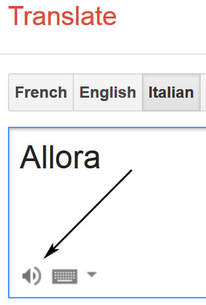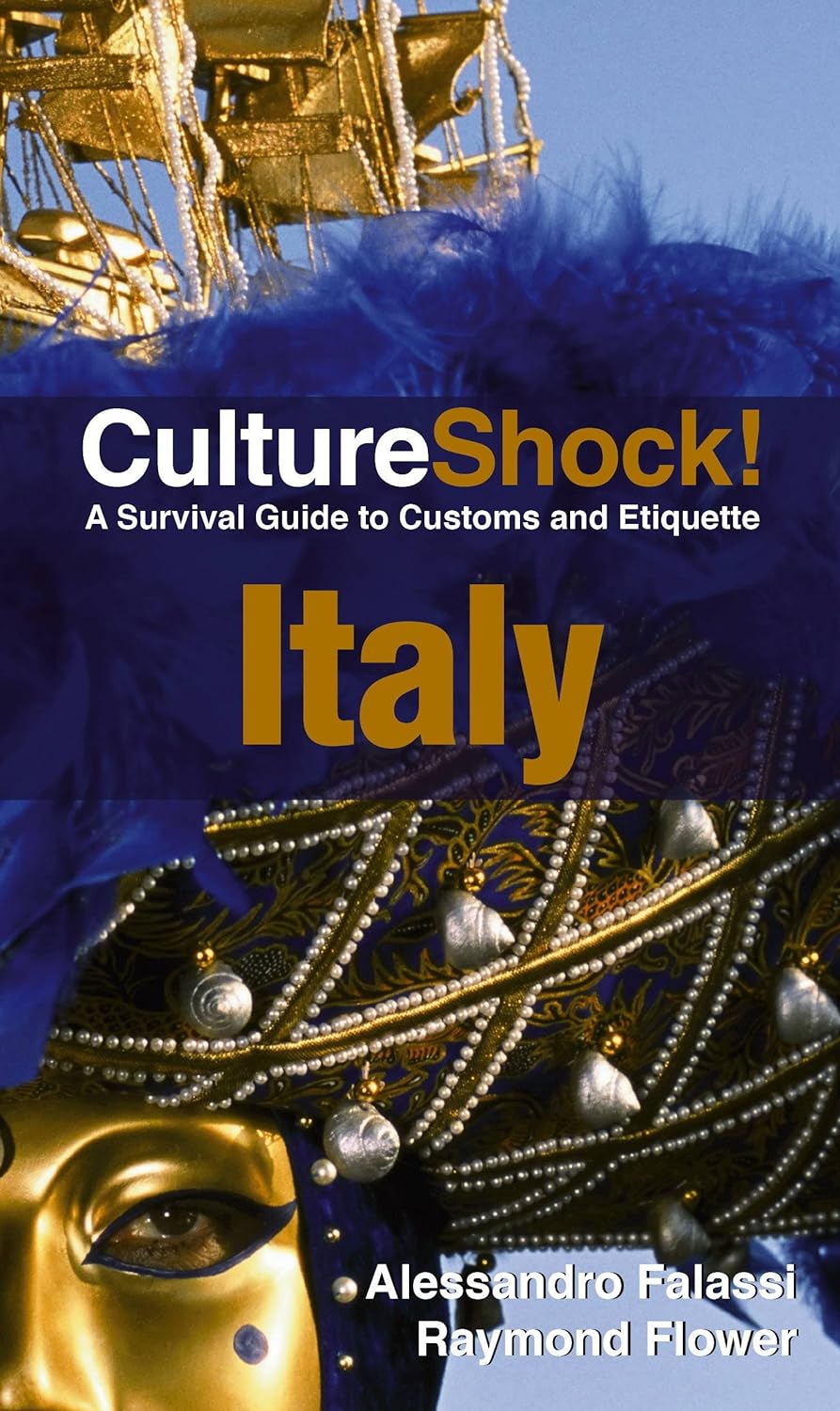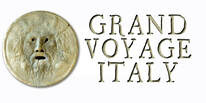|
Before I voyaged to Italy, I wanted to learn phrases that weren't the standard tourist expressions. I wanted help in the day to day situations that would arise... to assimilate into Italian life with "street language", possibly even including some well-chosen curse words. I've always held the belief that when traveling in a foreign country, one should make a decent attempt in learning at least some of the language. It's the polite thing, with the added benefit of not sounding like an arrogant "ugly American" tourist, but as a more seasoned World Voyager. I can still recall an Ugly American years ago in rural, central France demanding in an overly loud voice, "I would like some PLAIN bread!"... sheer embarrassment. For example, one of the more helpful non-tourist Italian expressions I learned was "Va Via!" (Hit the Road!) This became invaluable when being hawked by aggressive street vendors, beggars, scammers or someone trying to rob us. I used it several times with great success--they backed off and were given the impression that I was a confident local and not an easy mark, tourist. It was just as effective as in Paris when I felt a hand in my shoulder bag and yelled "Voleur!" (Thief)... drawing the French people's attention to the thief, causing him to flee. Sounding like a local is a real benefit and boosts your confidence when traveling. I've listed some expressions which are well worth learning for your next Voyage to Italy. And don't be shy about trying to sound Italian when pronouncing the words. Years ago when learning French, I imagined a mix of Maurice Chevalier (of "Every leetle breeze seems to wheesper Louise" fame) and Charles Boyer (for a deeper, sexy voice) when I spoke. Hey, it must have worked, because although I admit to speaking very poor baby-talk French, and I'm not that great at one-on-one personal conversations, at least my accent est très bon. A vendor in Paris, after asking where I was from said in surprise, "Ahh... but I took you for a Frenchman!" High praise indeed from a Parisian selling necklaces in a flea market.  Click on the link for each below to hear the pronunciation When the Google Translate window pops up, click on speaker icon under the Italian phrase to hear the pronunciation. Try to mimic your favorite, sexy Italian TV chef (Fabio? Luca?) when you pronounce these phrases. Use your best Italian accent and you'll do fine... Allora - This is used a lot in casual conversation as a pause to allow the speaker time to think of his next thoughts. It is used like "then", "oh well...", "therefore", "Mmmm, let me see... ". Examples: "Allora... tutto bene." (You see... Everything is fine); "Allora...prendo un risotto Milanese." (Let's see... I'll have risotto Milanese.); or after someone does something nice for you, you can stretch it out a bit and say "Allora, mille grazie!" (Well then, a thousand thanks!). Boh! - More of an exclamation for "I don’t know”, "I don't care" or "I don't want to hear it". It expresses your disinterest ambivalence toward the subject of discussion. The closest thing in English is “meh”, but Italian's use this a lot. Avete le mani d'oro - "You have gold hands", meaning the person is gifted in using his hands, as when complimenting a local artisan. Attaccalo al chiodo - Literally, "Stick it to the nail", meaning "forget about it" "leave it for later". Leccapiedi - A toadie, a boot-licker, a brown-nose--An ass kisser. They have them in Italy, too. Olio di gomito - Literally, "oil from the elbow. Referring to an exertion of physical labor, as we use "elbow grease". La mia macchina è in panne - Literally, "my macchina (car) is creamed". This is used to describe something broken, as in "Mia macchina ha una panna, allora prendo un taxi." (My car is broken, in that case I'll take a cab.) Che ne so - Used as a sarcastic response to someone asking something that you don't (or couldn't possibly) know. A gesture typically accompanies this phrase... a shrug of the shoulder along with wavering hands turned toward the sky as you shake your head "no". Use it as we do when we say "How in heck should I know?" rather than the more precise and formal "Non lo so" (I do not know). Non mi va - This means something like "It doesn't go with me" and is used when someone suggests something that you don't or won't agree to. Use it casually as you would say "I don’t feel like it", for instance if someone suggests a restaurant that you wouldn't like, or with a stronger voice if you are trying to get rid of a pushy vendor or hawker on the street trying to sell you something that you'd never buy... "Allora... Non mi va!". Kids will say it to get out of doing what their parents tell them to do. In bocca al lupo - Literally, "in the wolf’s mouth". Used to wish someone good luck, meaning to aim into the wolf's mouth to kill it (the wolf represents the difficulty they are facing). When wishing someone will overcome something more serious, use "crepi il lupo", literally, "Croak the wolf!". Sort of like when we say to someone "You'll beat it" or "You'll kill it". Always use this when wishing someone Good Luck. Neanche per sogno - Literally, "Not even in (your) dream". Used to slap back someone's offer or when you don't agree with a suggestion, such as "Not in your wildest dreams" or simply "No way!". Sono stanco - Literally, "I'm weary (tired)". Use after a long day of walking around tourist sites, such as "Sono stanco. Troppo a piedi. Ho bisogno di gelato freddo!" (I'm tired. Too much walking. I need a cold gelato!") Magari - This is slang for "maybe" or perhaps "if it could only be true". You could use it expressing hope to win the Lotto or meeting the perfect mate, or "Voglio avere figli... magari" (I want to have children... I could only wish.) Ogni morto di papa - Literally, "Every Death of a Pope", used the same as "Once in a blue moon". Make sure to accent "Papa" correctly... accent on the first syllable (PA-pa). If you say "pa-PA" you are taking about your Dad. Salve, come va? - Literally "Hello, how’s it going?" The more formal way is to ask "Buongiorno, come stai?"(Good morning, how are you). It’s a less formal way of greeting someone, but use "come sta" in formal or business situations. Galeotto fu il libro - "Jailbird was the book"... an odd expression referring to matchmaking two people. Perhaps referring to when a guy gives a girl a book (a present) they'll become imprisoned--in love. Some of the roots behind these expressions are really difficult to comprehend. Promettere mari e monti - Literally, "Promise the seas and mountains". Used like "Promise Heaven and Earth". Examples: "Non mi prometti mari e monti" (I am not promising Heaven and Earth" or "Mi ha promesso mari e monti" (He promised me Heaven and Earth"). Non chiedo la luna - "I'm not asking for the moon". Used when frustrated with someone complaining about a simple request. One of the more useful expressions to make your request in a restaurant or hotel seem like it's coming from a more seasoned Voyager who can't be taken advantage of. (I wish I knew this one when picking up rental cars at Hertz!) Andare a monte - (ahn-DAR-eh a MOHN-teh) - Literally, "Go to the mountain", but it figuratively means that everything went downhill and failed. Examples: Un viaggio va a monte (The trip was called off); Il matrimonio è andato a monte (the marriage failed). Use to describe something that went awry or got fouled up. Ho peli sul mio stomaco - Literally, "I have hairs on my stomach", meaning you're not taking something seriously or that it's not bothering you. Ne ho fin sopra i capelli - Literaly, "I'm sick up to my hair". Use it the same as "I’ve had it up to here" or "I'm fed up to here" or "I'm sick and tired". You can use a hand gesturing to the top of your head with this. Capitare su un osso duro - Literally, "Happen on a tough bone". A pejorative. Use it referring to dealing with a tough cookie. A person who is "un osso duro" (a tough bone) is a bit thick and stubborn. You can also use "capo tosto" meaning "thick (tough) head". A hand motion goes with this... knocking your knuckles or fist on a table as you say it. Dare del filo da torcere - Literally, "giving a twisted thread". Think of a small, precocious child asking "Why... Why... Why" no matter how many times you give an answer. "Torcere" means to Twist. They’re never satisfied with your answers. To tell someone about your daughter's quizzical nature, you could say, "Mia figlia mi dà del filo da torcere" (My daughter gives me a hard time). In the positive, you might also use this to describe how smart and curious your kid is because he asks many questions. Essere in alto mare - This is a common phrase used when someone has procrastinated and discover that they are behind on a project. It literally means that you are in deep water with a long way to go before getting finished. Mi fa cagare! - Instead of the much more polite "È orribile" ("It's awful!"), Italians will say bluntly, "It makes me poop," . So, when taking about "That restaurant? Mi fa cagare!" "Her new dress?! Mi fa cagare!" "That new American singer? Mi fa cagare!" Mi sento le mani prudono - Literally, "I'm feeling itchy hands" means you feel like hitting someone... you're pissed off. Be careful how you use this. Figurati! - Literal, "Imagine (that)!", used as "Don't worry about it!" or "It's nothing!" You can use this in both positive or negative ways. "Thanks for a great meal... Figurati!" or when to act innocent and blameless when you've just dented someone's fender who just cut into your lane, "I'm so sorry I ran into you... Figurati!" It's like saying "mi scusi" (excuse me) without really meaning it. Dai! - This simply means "Come on!" as in, "Please, you can't deny me." When someone refuses your suggestion to go have a drink, you say "Dai!" along with a motioning hand gesture toward yourself. You can also use it to try to stop someone from doing something negative. "Why are you pushing me? Dai! Wait your turn!" Meno Male! - Literally, "less bad." Oh, HE got elected? Meno Male! As long as that other jerk didn't win!" "I passed the test? Meno male!" Che palle! - This is a rather crude, but everyday expression meaning, “what balls!” or "what a pain in the ass!" but stronger than "what nerve!" Ho perso il mio portafoglio. (I lost my wallet.) Che palle! (What a pain!) Grazie a Dio! - "Thank God!" used the same way we use it to express great relief. Always include the "a" (meaning "to")... "Thanks to God" otherwise, you would be thanking God directly. Che guastafesta - Roughly translates as "What a party pooper". Guastafesta is a combination of two Italian words: the verb guastare, “to spoil” or “to ruin,” and the word festa, which means “party.” Use it when anyone is putting a damper on your fun or a monkey wrench into your plans. Ma, che sei grullo? - Used more in Florence, literally "But, how stupid are you?" It's used like "Are you kidding?" or "Are you crazy?" to friends. Say it to a stranger and you might get in trouble. Example: "I'll pay for dinner." Response, "Ma, che sei grullo?" or "You paid that much for those shoes? Ma, che sei grullo?" Scappo! - Slang for "escape" or "I'm gone" or "I'm outta here!". Basta! - Literally, "Enough!". This can be used in simple ways, like telling a waiter when he's put enough pepper on your dish, or more forcefully when someone is BS-ing you, as in, "Basta! Non voglio sentire altre scuse!" - "That's enough! I don't want to hear any excuses!" Can be combined with above... "Scappo! Basta!". A fagiolo - Literally, fagiolo means “bean,” but the phrase a fagiolo (“to the bean”) means something like the English “to the letter” or “to a T.” It indicates to someone that you are expecting precision from them. Ti scureggia il cervello - Use this only with friends, or when you really want to insult someone. It means, literally, "your brain is farting". A Roman expression. Cazzata - Literally "Crap!" or perhaps a bit more blunt, as it's derived from "cazzo" (f*ck). Used when you get a whiff of someone's BS. Or to scold yourself when you said something crappy or stupid, "Dio, ho detto una cazzata," meaning, "God, I said something f*cked up." Figo - Slang for "Cool", meaning something great or nice. Used to describe things or people. End it with an "a", "Figa" can also describe a cool (or rather, "Hot)" female, but be forewarned, the word "figa" is also used as a very crude reference to a woman's vagina (similar to "c*nt"). A "figata" is something that is cool or great--used as the opposite of a "cazzata." Mannaggia - Used as "Damn!" or combined as "Manageria miseria"--"Damned misery!" Used to express utter frustration with someone, something or a frustrating situation. Zitto - Slang and abrupt was to get someone to keep quiet. "Zitto!" or "Stai zitto!" means "Shut up!" or "Shush!" I hope you'll put some of these expressions to good use during your next Voyage to Italy. This was a long post, Sono Stanco! If only I had someone else to write these posts for me... magari! Scappo! --Jerry Finzi If you found this article useful, post links to it all around the world, in every country, in every forum, in all the schools, in the houses of Congress, on the plains of Africa, in New York, Paris, Rome... er... Forget it. Just LIKE and SHARE it... pretty please? |
On AMAZON:
|




 RSS Feed
RSS Feed

